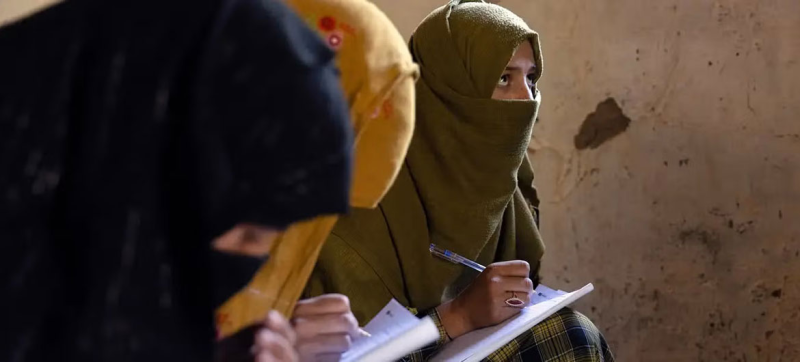- Khaleda now not fit for travelling: Medical Board |
- Panchagarh records lowest temperature 10.5°C so far this year |
- Christmas returns to Bethlehem after two years of Gaza war |
- কলাপাড়া মুক্ত দিবসে এবার সাড়া নেই কার |
- One killed, two injured in attack at Ctg meeting over marriage |
Four Years On, Afghan Girls Remain Barred From School

Women learn to read and write through a UN Women-supported literacy initiative in Nuristan province, eastern Afghanistan.
For millions of girls in Afghanistan, it has been four long years since the ban on secondary education came into force—one of many rights abuses imposed by the de facto authorities after they regained control of Kabul.
At the time of the ban, girls like Fatima Amiri were targets of violent extremists determined to drive them away from learning. She was 17 when a suicide bomber blew himself up in her classroom in Kabul in 2022, killing more than 50 of her classmates and leaving her with life-changing injuries.
Now living abroad, Ms Amiri is an advocate for Afghan girls who are desperate for their schools to reopen. “They are crying, they are sending me messages, saying that we want the right to education,” she says. “The only thing they had was education, and now they do not have it.”
According to UN Women, more than nine in ten Afghans support girls’ secondary education. Yet, despite appeals from UN agencies and partners, the Taliban continue to enforce the ban while also restricting female aid workers—further complicating disaster response efforts, including after recent earthquakes.
UN agencies, including Education Cannot Wait (ECW), have condemned the ban and urged the global community to unite in support of Afghan girls. Current UN data shows that more than 2.2 million girls are barred from secondary school, while nearly seven million children remain out of class due to the ban and other constraints.
Speaking at the UN Human Rights Council in Geneva, Ms Amiri shared her testimony: “I’m just an example of many girls and women in Afghanistan who have been denied justice. The only thing I can do is be their voice—to share their message so others may help.”
Despite her injuries, Ms Amiri managed to pass her university entrance exam in computer science, but the closure of universities cut short her education. “I’m still fighting for my dream, for my right to education,” she says.
She urged member states to create opportunities: “If you cannot open my school, at least give me a scholarship, or provide online learning so girls can continue their education and work. We need options.”
Despite immense obstacles, Afghan girls remain determined. “They are unstoppable,” Ms Amiri says. “Even without internet or formal schools, they are studying at home, reading books, and learning from anyone with knowledge. They are still trying, every day.”

